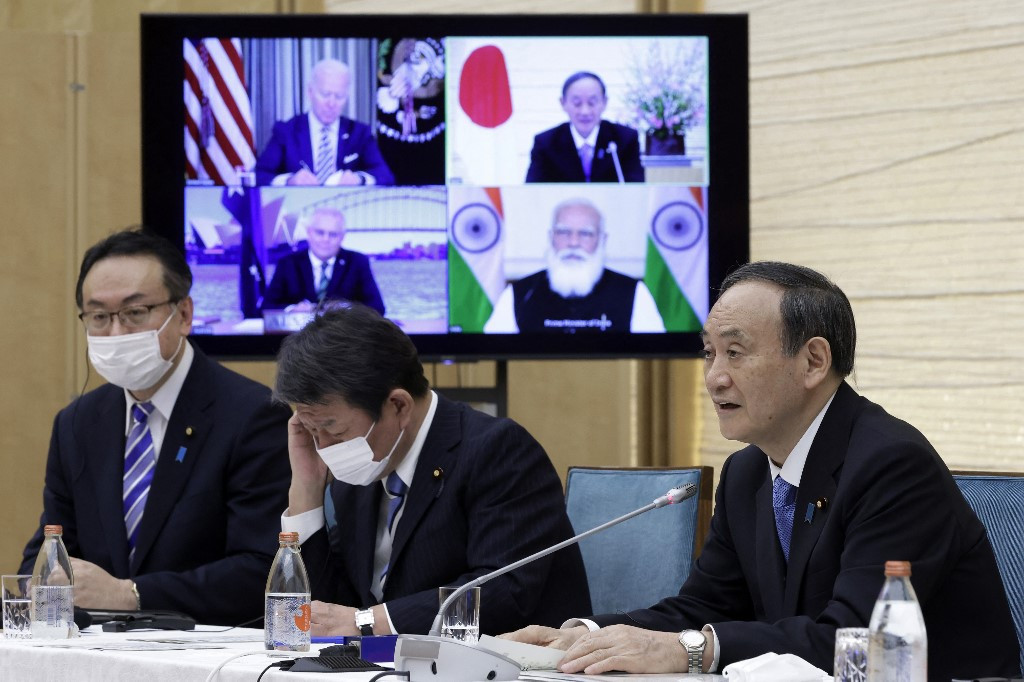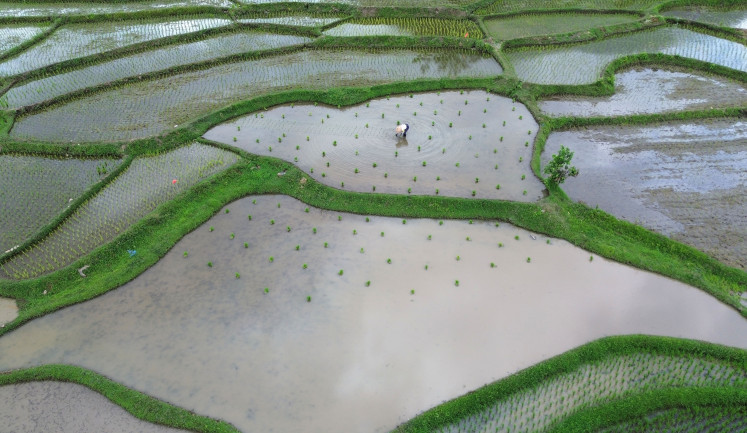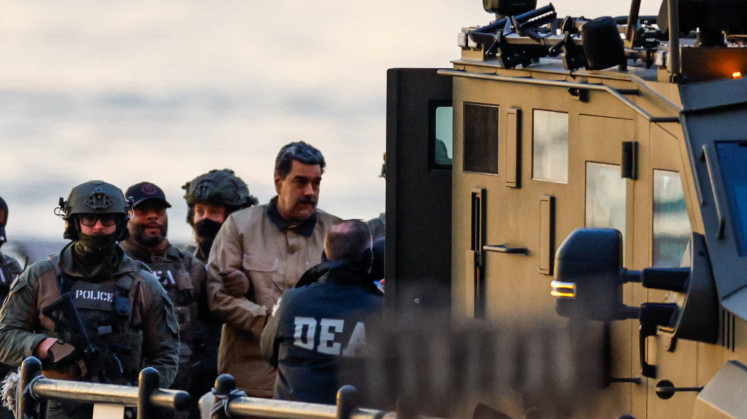Popular Reads
Top Results
Can't find what you're looking for?
View all search resultsPopular Reads
Top Results
Can't find what you're looking for?
View all search resultsFrom the Bandung conference to the Indo-Pacific strategy (part 2 of 2)
Whether in the trans-Pacific or trans-Atlantic arena, Indonesia is the one power that can bridge the Indo-Pacific strategy from the Pacific to the Indian oceans.
Change text size
Gift Premium Articles
to Anyone
 Japanese Prime Minister Yoshihide Suga (right) speaks on March 12, 2021 during a virtual meeting of the Quadrilateral Security Dialogue (Quad) at his official residence in Tokyo. Appearing on the display monitor in the background are (counterclockwise from top left) US President Joe Biden, Australian Prime Minister Scott Morrison and Indian Prime Minister Narendra Modi.
(Agence France Presse/Kiyoshi Ota )
Japanese Prime Minister Yoshihide Suga (right) speaks on March 12, 2021 during a virtual meeting of the Quadrilateral Security Dialogue (Quad) at his official residence in Tokyo. Appearing on the display monitor in the background are (counterclockwise from top left) US President Joe Biden, Australian Prime Minister Scott Morrison and Indian Prime Minister Narendra Modi.
(Agence France Presse/Kiyoshi Ota )
T
he United States, Australia, Japan and India held their first virtual summit on March 12. What was interesting about the meeting was the conspicuous absence of any mention of China. To a large extent, this was to prevent a self-fulfilling prophecy: Once an adversary is named, the opposing party has all the more reason to be aggressive in its defense; or worse, go on the offensive.
The “Quad”, which has the potential to become a "Quint" (with some analysts suggesting quietly that the fifth member could be Indonesia), can of course have more virtual meetings, and as frequently as they want, to broaden or narrow their countermeasures. And these meetings can have a large agenda arrayed against China or potentially China and Russia together, or even China's closest ally, North Korea.
However, whether it is a Quad or a Quint, Indonesia remains the most important power in the Indo-Pacific strategy that can bridge the Indian and the Pacific oceans.
If so, then the four nations’ policy advisors must be extremely good at guiding their leaders to maintain internal cohesion among themselves while working with Indonesia, which is en route to becoming a maritime behemoth as it increases its naval budget.
A Quad or a Quint is only strong insofar as it weeds out the weakest links to make the alliance a formidable one that possesses the strategic value of diplomatic dissuasion or diplomatic deterrent.
Whether this firmness can be made increasingly plausible for the alliance to succeed depends on avoiding the fate of the South East Asia Treaty Organization (SEATO) or the Central Treaty Organization (CENTO), with the latter also known as the Baghdad Pact. Both were formed during the presidency of Dwight D. Eisenhower with the blessings of then-US secretary of state, John Foster Dulles.
Internal cohesion is critical, especially for an entity whose members are all robust and dynamic democracies, with some occasionally succumbing to popular pressure in electing a president or prime minister who is not entirely convinced of the purpose of the Quad, let alone a "Quint".
Take the North Atlantic Treaty Organization (NATO). Last year on June 17 and 18, French Minister of the Armed Forces Florence Parly lodged a complaint over Turkey’s behavior in the Mediterranean Sea at a NATO ministerial meeting and received the support of just eight out of 30 allies. The US and UK were notably not among France’s supporters.
The surprise, almost shocking, election of president Donald Trump, for example, had him destroying the Trans-Pacific Partnership on his first day in office on Jan. 20, 2016. But his erratic behavior also undermined US ties with its Trans-Atlantic partners, including Germany and France.
Over his four years in office, Trump was not persuaded that Russia posed a threat to the democracies of the US, the UK and the 27 member states of the European Union (EU) through a cyber disinformation and misinformation campaign.
More importantly, the Trump administration did not truly believe that the members of the North Atlantic Treaty Organization (NATO) were all paying their dues. This attitude was also exported to the Indo-Pacific, despite the region having a National Security Strategy from the US State Department in 2017 that had long identified China as a "strategic competitor". This language was further amplified in the Indo-Pacific Strategy of the US Department of Defense, released on June 1, 2019.
While "democracies do not go to war against each other", according to Bruce Russet at Yale University and Michael Doyle at Columbia University, when they do go to war together, "they do fight to win".
Indeed, one must not discount the fact that democracies are strongly tied to good governance. In the era of COVID-19, which could and has indeed become endemic, the pressure on democratically elected leaders has been humungous, according to The Economist,
This is happening as the global demand for vaccines now far outstrips the aggregate supply of all the pharmaceutical companies of the West and the East, and including the incipient efforts of some countries in Southeast Asia that are trying to produce them locally, such as Vietnam, Indonesia and Thailand.
A population that is sick and in constant need of the state’s financial support can lead to a dynamic under which the people might choose a leader that could either prolong their livelihood or their very lives.
Moreover, while the US is legally obliged under a treaty to defend Thailand, South Korea, Japan and Australia under its "hubs and spokes" security program, the three other Quad members are not legally obligated to come to India’s aid, should its sovereignty in the Himalayas be violated.
The same goes for the Strategic Quadrilateral Dialogue, also "Quad", in the trans-Atlantic arena, where UK Prime Minister Boris Johnson has urged Germany, France and Holland to form their own Quad to manage the ramifications of a rising China, which seems to operate on its own strategic terms with regard to internal issues such as Tibet, Xinjiang, Taiwan, Hong Kong, and by extension, the South China Sea.
Indeed, China has been defining the latter as an internal issue since 2012, a point the Obama administration categorically challenged through then-secretary of state Hillary Clinton. France’s Indo-Pacific document is from its armed forces ministry, but it did not define what should be the Indo-Pacific strategy of other ministries or other members of the trans-Atlantic quad.
As for the UK, its grand “Global Britain” strategy, led by John Bew, refers to another document called "Tilt to the Indo-Pacific". Old or new, the world is being reshaped. Clearly, the trans-Atlantic quad already exists, as all four European nations have an Indo-Pacific strategy.
***
Phar Kim Beng is founding CEO of the Strategic Pan Indo-Pacific Arena (SPIPA); Osman Erdoğdu is SPIPA’s chief knowledge officer. This is the second of a two-part series. Read part 1 here.









